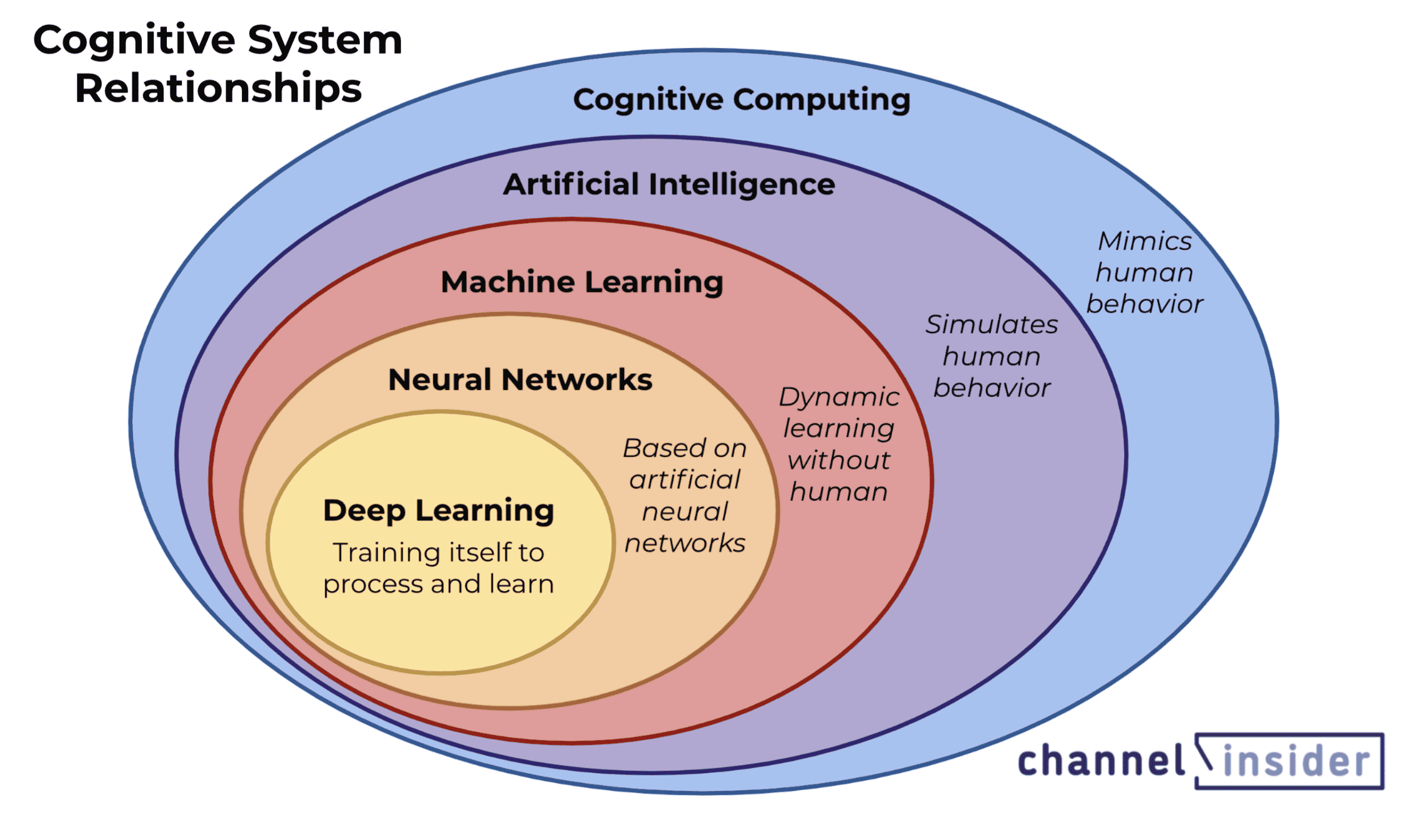
Ever-evolving technology, environments, and consumer demands owe a lot to innovation in cognitive computing. From artificial intelligence (AI) enabling machines to simulate human behavior to deep learning training itself to process and learn, these developments are capable of producing the next big jump in industry efficiency and opportunity.
As IT vendors continue to develop and offer cognitive solutions, how are these technologies being deployed to partner networks, and how can managed service providers (MSPs) put them to good use?
Channel partners and MSPs continue to explore the applications that AI and machine learning (ML) have for both their own operations and fulfilling the needs of their business clients. With hybrid infrastructures seemingly the future of enterprise organizations, MSPs can expect a growing demand for comprehensive technical services to design, implement, and secure the modern IT environment.
This article looks at what cognitive computing offers, how MSPs are approaching the availability of AI and ML capabilities, and more.
- What Does Cognitive Computing Offer?
- Channel Partners, MSPs, and Artificial Intelligence
- Who’s At the Top of the Cognitive Supply Chain?
- Are Channel Partners Using Cognitive Services?
- Options for Implementing Cognitive Services
- Vendors Share Blame for Slow Adoption
- Channel Case Studies in Cognitive Computing
- Types of Cognitive Systems
- Enterprise Cognitive System
What Does Cognitive Computing Offer?
While the limits of cognitive systems have yet to be realized, there are dozens of noted use cases where artificial intelligence is changing organization workflows. A few of the valued enhancements include:
- Processing vast amounts of marketing and product data for sales and service teams
- Natural language processing that enables seamless written and speech communication for document analysis and customer service
- Automated detection and response capabilities using threat intelligence and ML to identify and remediate malicious behavior that threatens cybersecurity
Channel Partners, MSPs, and Artificial Intelligence
Managed service providers play a critical role in providing advanced, necessary services. Often becoming partners and valued counsel, MSPs influence how clients make future investments and operational decisions.
As AI deployment can improve operational efficiency, reduce risk on business decisions, and improve and fortify cybersecurity, it’s just a matter of time before AI solutions become common in the channel.
Leading us to the question – what specifically are AI’s applications for channel partners and what do MSPs need to know about cognitive capabilities? As evidence of AI’s benefits piles up, it’s possible certain industries will transform overnight in the mad dash to secure advanced cognitive services.
Who’s At the Top of the Cognitive Supply Chain?
Cognitive Computing Vendors for the Channel
Amazon Web Services
The cloud giant, Amazon Web Services (AWS), has an extensive product offering for AI and ML-enabled technologies. Applications for AWS cognitive services include fraud detection, business forecasting, and media intelligence.

Google Cloud Platform
The Google Cloud Platform (GCP) offers two dozen AI and ML capable products that apply to document processing, product recommendations, data analysis, and more. GCP’s Vertex AI enhances development operations with BigQuery ML and pre-trained APIs.

IBM Cloud
A leading innovator in the cognitive space, IBM offers AI for customer service, business automation, and natural language processing. IBM also offers Explainable AI helping human users comprehend and trust ML algorithms and their results.

Microsoft Azure
The second-largest cloud platform offers Azure Cognitive Services to give developers and organizations access to a suite of applied AI and ML models. Azure’s cognitive services include capabilities for analysis of decisions, language, speech, and visuals.

Are Channel Partners Using Cognitive Services?
Looking at the volume of cognitive services offered by big-name providers like IBM and AWS, one could reasonably ask how much are these solutions utilized. Despite the evident supply, is there a demand from channel partners to adopt AI?
We asked veteran channel executive (and Channel Insider contributor) Howard M. Cohen, who stated:
“It’s inaccurate to consider ‘the channel’ to be homogenous. The skill sets and skill levels available from the channel partners are all over the map…Channel partners are definitely in the AI, ML, and cognitive business. Just not all of them.”
Knowing cognitive services are indeed in use for the channel space, we evaluate how AI models differ, what a cognitive system for channel clients might look like, and options for interested MSPs and channel partners.
Options for Implementing Cognitive Services
- Deploy and resell cognitive solutions and apps from a cognitive services vendor
- Build your own cognitive apps using in-house or vendor-supplied AI models
- Collaborate with AI vendors and partners to develop cognitive solutions for your market
Vendors Share Blame for Slow Adoption
While the supply of AI and ML services is high, organizations and channel partners have been slow to adopt cognitive solutions. One roadblock industry analysts point to is the nature in which cognitive services are packaged. For the time being, a bulk of the products offered are embedded technologies in other products.
Playing out this scenario: If a client found the perfect solution, acquiring the technology would come at the cost of the umbrella product when it could have little use to the organization. How much this has deterred companies from purchasing cognitive software is difficult to say.
And therein lies the message for cognitive computing vendors who want to partner with MSPs, VARs, and the like: They need to offer solutions that are simple, practical, and well-targeted if they want to tap the massive channel opportunity for AI and related services.
Channel Case Studies in Cognitive Computing

Crushbank
CHIPS Technology Group, known as CHIPS to the channel, is a long-time MSP founded in 1993 by Evan Leonard and David Tan. Twenty-two years later, the two founders started another company, Crushbank, to address the inefficiencies for the all-too-familiar IT help desk. Boasting its service as the first help-desk application built on IBM’s Watson, Crushbank is just one example of a channel partner actively deploying AI.
With an annual turnover of 38% for IT help desk employees and a lack of searchable, structured IT service management (ITSM) data, the CHIPS subsidiary aims to improve help desk productivity, reduce turnover, and enhance onboarding for new IT support hires. Powered by Watson, Crunshbank offers clients sophisticated responses to queries, natural language processing, and machine learning.

Cybereason
Since 2012, Cybereason has become a prominent cybersecurity vendor offering antivirus, endpoint protection, and managed services. By incorporating AI, ML, and behavioral analytics into their portfolio of solutions, Cybereason can enhance its services to clients and offer its technology to channel partners.
Two examples of Cybereason channel partners actively using cognitive systems in their business model include LogicHub and Siemplify in the workflow and response space. LogicHub, once a SOAR-only solution, offers its clients an automated security platform that aims to mimic the cognitive skills of expert analysts. Siemplify similarly is on a mission to address SOAR inadequacies by offering ML capabilities that improve productivity, efficiency, and visibility.
Types of Cognitive Systems
While cognitive computing hasn’t yet reached its potential, the buzzwords associated with the space have had a field day in recent years. Technologies like AI, ML, neural networks, and deep learning are used frequently and often interchangeably – but they aren’t the same.
To understand what the market offers, unpacking what cognitive systems are is a prerequisite.

Like squares and rectangles, an example of cognitive computing is deep learning, but as the most advanced form, deep learning is indistinguishable from an AI system.
- Cognitive computing is the foundational ability of machines to mimic human behavior.
- Artificial intelligence enables machines to simulate human thinking and behavior.
- Machine learning facilitates learning through past data without explicit programming.
- Neural networks combine ML algorithms, creating an ecosystem of learning nodes.
- Deep learning includes multiple neural network layers that enable self-training.
Enterprise Cognitive System
For larger organizations, the enterprise cognitive system (ECS) addresses the problem of unstructured business context. Today’s data collection habits mean volumes of business context are ambiguous, evolving fast, and multi-faceted.
Features of an ECS
| Adaptive | Capable of unsupervised learning, processing dynamic and incremental data in real-time |
| Interactive | Easy-to-use, compatible with hybrid network systems, and embedded in existing workflows |
| Contextual | Motivated to resolve ambiguous data and capable of remembering prior interactions |
| Iterative & Stateful | Comprehends contextual elements and different types of data |
Applying ECS
While an appealing framework, developing an ECS only applies to a fraction of the diverse and sizable channel space. Larger organizations, including MSPs, managing large amounts of data for hybrid infrastructures are the most likely to benefit from adopting cognitive systems at this time.

